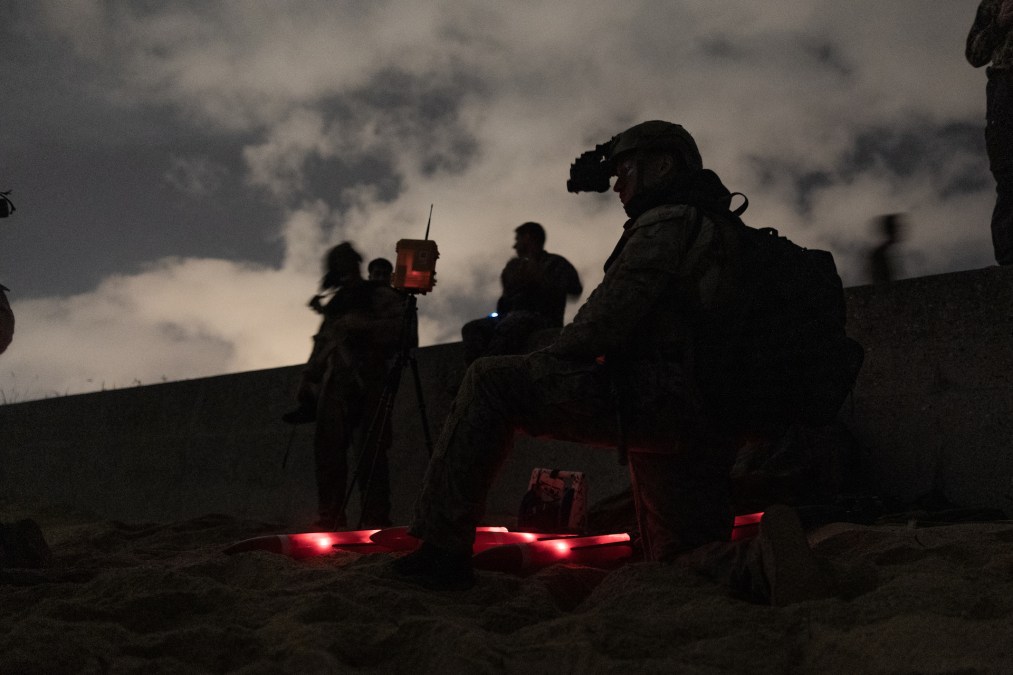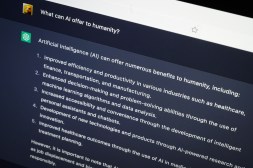Marine Corps releases AI implementation plan

Marine Corps officials unveiled the service’s new artificial intelligence implementation plan, laying out timelines for achieving key objectives and milestones for digital transformation.
Lt. Gen. Melvin “Jerry” Carter, deputy commandant for information, approved the 57-page document April 23 and it was recently published. The plan was developed following last year’s release of the Corps’ AI strategy.
The service sees artificial intelligence capabilities as transformative technologies to “enhance decision advantage in the evolving landscape of modern warfare,” officials noted.
The AI implementation plan includes objectives and tasks related to five strategic goals.
Tactical innovation is one of the main objectives related to achieving the goal of “mission alignment.”
No later than March 2026, the implementation plan directs the deputy commandant for information (DC I) in coordination with the deputy commandant for combat development and integration, to “develop a use case process that captures, assesses, and prioritizes concepts for the application of AI from across the warfighting functions, and at all echelons, to implement targeted actions” as well as “identify major roadblocks in policy, workforce, and infrastructure that have a large impact on innovation and acceleration of AI implementation to mitigate through change.”
The DC I must also oversee a digital transformation pilot project, which will include the deployment of “digital transformation teams” to support commanders with incorporating new tools across their commands. The pilot will focus on delivering digital, data, analytics and AI solutions; process optimizations; and advising on opportunities and risk of digital, data, and AI employment, among others. The Corps has already begun deployment of the digital transformation teams, according to Marine Corps AI lead Capt. Christopher Clark, who helped prepare the implementation plan.
Another strategic goal is to develop what the Corps calls an “AI competent workforce.”
The implementation plan directs the commanding general of Training and Education Command — no later than March 2026 — to identify available learning tools and resources across the Defense Department and industry and centralize them in a repository to enhance “proactive learning.”
The TECOM commander must also identify costs and requirements for licensing external training resources outside of the Marine Corps, while aligning with Fleet Marine Force capabilities and existing programs of records “to enable shared funding and rapid acquisition to determine long term viability and funding.”
Meanwhile, no later than November 2025, the deputy commandant for manpower and reserve affairs will “analyze career retention compensation opportunities, to include, at a minimum, monetary, billet preference, established career-progression opportunities that support the development and retention of the AI workforce,” per the implementation plan.
That official must also analyze how to maximize return on investment in the civilian information-related workforce segment; methods to standardize the prediction of future civilian workforce needs; and how to improve position descriptions, speed up hiring and make civilian workforce data more accessible for talent management initiatives.
Another strategic aim is to enable AI deployment at scale.
No later than April 2026, the DC I must “incorporate data-centricity into all levels of inspection programs to be inspected annually, and establish a baseline for the data culture to measure progress against. This includes, but is not limited to, the Commanding General’s Inspection Program and other Service and Marine Expeditionary Force-level inspection programs,” per the implementation plan.
The DC I is also tasked with updating Marine Corps Tactical Publication 3-30B Information Management to incorporate “the changing dynamics of data-centricity and AI technologies on information management.”
In coordination with the deputy commandant for combat development and integration and the commander of Marine Corps Systems Command, the DC I is directed to “establish a data architectural framework that informs the requirements development and procurement process for establishing an enterprise data solution that employs data standards, application programming interface- (API-) based services, and AI solutions.”
A new AI infrastructure operations planning team will also be set up to identify and accelerate immediate infrastructure requirements for cloud, on premises, and tactical applications, as well as identify legacy systems for divestment. The effort is expected to yield recommendations on storage and compute, development environment, resource management and machine learning platforms to enable ML operations.
To enhance cybersecurity, no later than September 2027, the DC I is tasked with reforming the Risk Management Framework to “embrace automation and reduce administrative overhead” and “provide data security posture management solution to enable data-centric security and Zero Trust.”
Meanwhile, the commanding general of Marine Corps Forces Cyberspace Command is expected to coordinate defensive cyber operations and cybersecurity functions to defend AI-enabled systems.
AI governance is another strategic focus area.
No later than September 2025, the DC I must incorporate applicable AI governance requirements “into the Commanding General’s Readiness Inspection for enforcement and oversight,” as well as conduct a policy analysis to “identify gaps, inefficiencies, and where current policy does not align with strategic goals,” according to the implementation plan.
To advance the strategic goal of boosting partnerships and collaboration with industry and academia, the commander of Marine Corps Systems Command — no later than December 2025 — must establish cooperative agreements and contracting vehicles for AI development and adoption and coordinate “regular industry-focused events for info sharing and capability demonstrations that contribute to awareness and adoption of relevant technologies.”
No later than April 2026, the DC I, deputy commandant for manpower and reserve affairs and commanding general of TECOM must evaluate and move to expand organizational relationships with university-affiliated research centers, academic institutions and federally funded research-and-development centers to tackle “AI problem sets.”
Meanwhile, the DC I is tasked with conducting an assessment on the feasibility of establishing a new Center for Digital Transformation. The initiative would be expected to “provide digital, data, and AI knowledge-based products designed to support and grow a healthy ecosystem, developer community, and user base” and “accelerate the fielding of emerging technologies, including AI, across the Service via strong connections with industry and academia,” according to the implementation plan.
The Corps aims to have a plan in place for a three-year Center for Digital Transformation pilot no later than September 2026.






